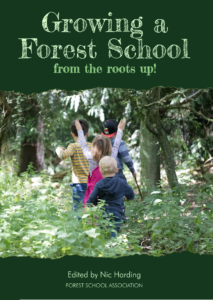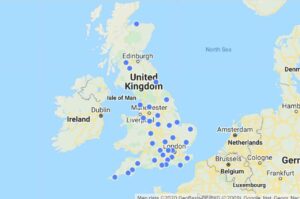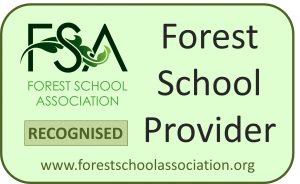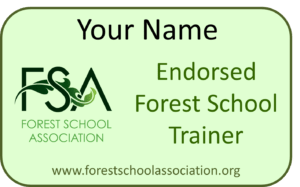Number 9
Summary & Collated Notes
Topic: Encouraging Risk
Speakers: Dr Nevin Harper
Webinar Style: ‘In the Thicket’ – Topical presentation
Total Number Registered: 142
Total Number attended: At 8pm – 48 . Averaged 52, max 55.
- Welcome from Chairperson (Matt),
- Zoom Etiquette (Nic)
- Update from the FSA (Matt):
- Latest FSA update relating to COVID – 19 https://forestschoolassociation.org/ncorona-covid-19-and-forest-school/
- FSA are leading a campaign to lobby government for a ‘Nature Premium’ find out more on the website – www.naturepremium.org and Sign the Petition! https://you.38degrees.org.uk/petitions/reconnect-children-with-nature
- As we come out of lockdown, we are reducing the number of webinars to 1 a month, next one is Wednesday 5 August 2020 with Sara Knight
- Intro to this webinar’s topic & Welcome to Dr Nevin Harper
Nevin Harper, PhD, is an associate professor in the school of child and youth care. His research and practice career centres on alternative approaches to working with youth and families involved in systems of care and incarceration. His graduate research was focused on risk management and decision-making in outdoor adventure leadership at the Master’s level, and then on family-level and systemic change in adolescent wilderness therapy. Nevin prefers to spend more time outside than in, and is an advocate for moving many educational and therapeutic practices outdoors. https://www.nevinharper.com/
Dr Harper has several books out, but talked about two in this presentation as being .
Dr Nevin Harper started by giving thanks to the land and first Nations People. He set the scene of his talk today, addressing some key questions.
Please see Dr Harper’s Presentation here
- Main Content:
- Risk as opportunity for growth (often can be referred to as loss)
- Recognition that some individuals may have too much risk
- Adventure definition. Outcomes unknown. Risk & Adventure = Challenge. Need a balanced approach. Importance of assessment – what type of activities are appropriate for which individuals.
- What is Risky Play? Types of Outdoor Risky Play:
- Great Heights
- High Speed
- Dangerous Tools
- Dangerous Elements
- Rough and Tumble
- Disappear/ get lost
- Benefits of Risky Play. Links to research and references.
- Polyvagal Theory (Stephen Porges) – Bodily Felt Learning. Connecting with nature and engaging in risk allow opportunity for child’s inner and outer worlds to be felt, processed and expressed.
- Attention Restoration Theory – research describes how our ability to focus attention is improved by time in nature, as well as stress reduction.
- Real Risks? Providing statistics on: stranger danger, traffic, sports injuries, human error in hospitals
- Precarious balance – need more education to parents, practitioners, media etc about benefits of risky play, so less judgement and fear of litigation. Research supports risky play as part of healthy childhood development.
- Practice considerations –
- being mindful of assumptions
- Being present to perceived risks
- Risk Re-framing
- Utilising the environment
- Training in self/co-regulation – relationship building
- Dr Nevins books:
Nature-Based Therapy: a practitioners guide to working outside with children, youth and families. E-book now available
Outdoor Therapies – An Introduction to Practices, Possibilities and Critical Perspectives. Edited by Nevin J Harper and Will W Dobud. – Preorders now available – Use the code BSE20 for 20% discount
- Q & A
How much has risk benefit analysis been taken up by the Canadian education sector?
- A toolkit – https://www.outdoorplaycanada.ca/portfolio_page/risk-benefit-assessment-for-outdoor-play-a-canadian-toolkit/
- Study on how many accidents are actually happening.
Do we know yet exactly how play in nature versus play say in a hard-core playground affects the activation of the vagus?
- Attachment theory being applied to connection with nature (as opposed to parent).
- Can amplify effects through mindfulness activities, building relationships having conversations, making people more aware of bodily sensations
- Big thanks to Dr Nevin for leading the webinar
OPTIONAL HALF HOUR (9 – 9.30pm)
Attendees who wished to remain had 2 choices:
- To continue discussing sites and asking Jen & Elsa questions
- To join a sharing circle, community building, uplifting session (Jon)
Participants joined relevant room
Continued Q & A and Discussions – 36 people participated
Any research about differences in attitudes to play due to gender?
- Practitioners may carry ideas of gender into the play. E.g. One study recorded Male practitioners being more liberal in their attitudes to risk.
- Parenting may be an influence – not aware of any studies on this.
- As well as gender it may also be influenced by perception of child capacity more generally.
- Discussion about whether play activities are chosen by individuals or a social construction?
Discussion about cultural awareness and how our assumptions as practitioners may be very different to the participants experience.
How do we include the perspectives of participants from different cultural experiences when planning programmes?
- Importance of sense of place and sense of self within that space. Can introduce new places, new species through nature education and connection.
- Nevins work involves meeting clients local to where they live, so to build relationships between them and the natural world.
Issues of Landownership as an issue in UK? Many people don’t have access to land, therefore influences their opportunities in childhood. Any Thoughts?
- Nevin also has issues where he lives (Vancouver Island) and seeing problems – such as public land being fenced off for timber companies and therefore more people in smaller areas creating degradation.
- He shares First Nations names and stories of land when working with others.
Discussion about Mental Health Crisis as a result of lockdown.
Sharing Circle –
- Discussion about gender – how FS is a good leveller, especially over long-term programmes.
- Hoping that outdoor bubbles started during lockdown continues post-COVID, worries about catch-up curriculum affecting sessions.
- Lessons from foraging – risk vs benefits
- Importance of play for teenagers, especially now post-lockdown
- Importance of adults modelling playful attitudes, especially now. ‘Making Sense of Play’ by Perry Else was mentioned as a good source of information
Everyone Came back together for the final closing – 36 people
Some Final Thoughts from Jon
To facilitate play – how playful do we need to be during these times?
How to embrace the new-ness?
An Invite to think about this week – reflect on the uncomfortable, find a new stranger, how are we going to embrace the new-ness?
Jon finished by reading a poem:
‘REFUGE’
From ‘Pilgrim: Poems by David Whyte’ ©2012
Sometimes a nook, a wall half down,
a swerve in the path where the breeze
can’t catch you; other times a made shelter,
a shepherd’s build up of flat stones curved
to keep the wind off. Once, at the top of the pass,
it was a cave in the mountain rock taking you in
from the swirl and eddy of snow and the killing cold
so you could live to the grey blank dawn.
Then in Galicia, it was a breath of warmth
from a kitchen door, palatial with light
and a daughter’s smile, the family behind,
asking you in, as if to say, of all shelter,
traveller, you’ll ever find on the road,
even with those you know,
the stranger’s love is best of all.
Thanks to all for attending!
Meeting Closed: 9.40




